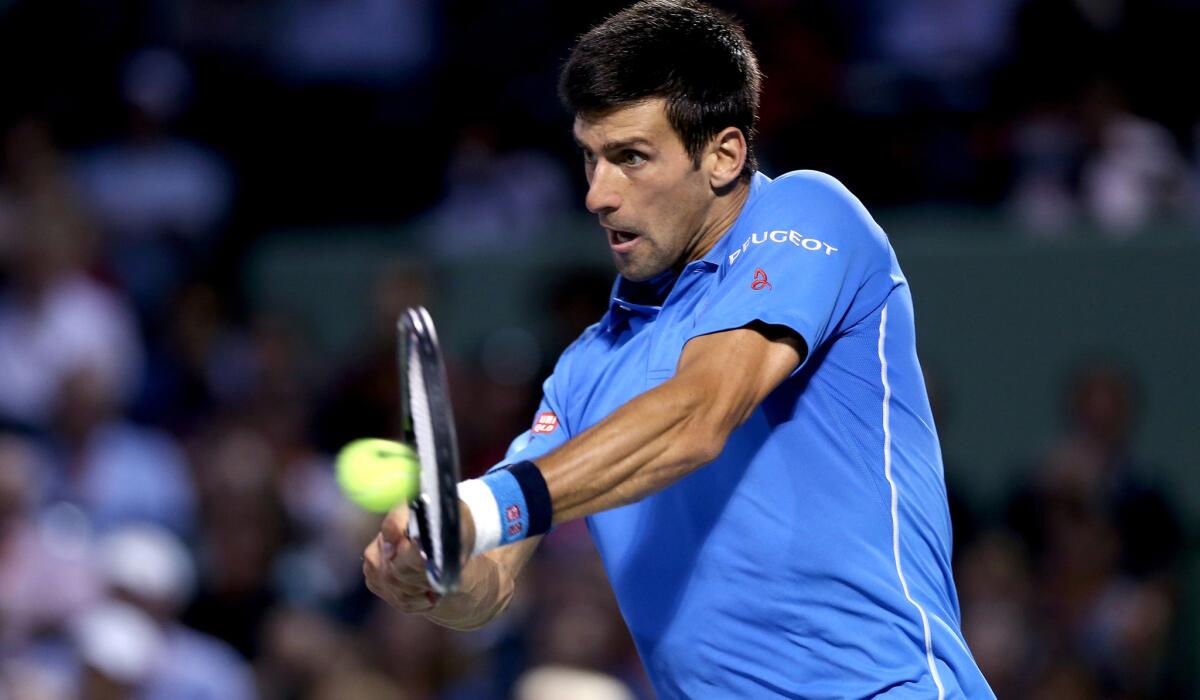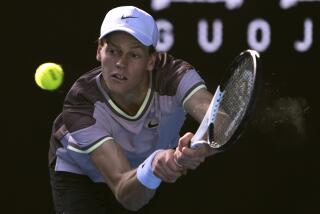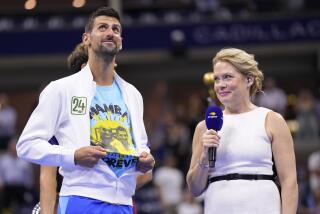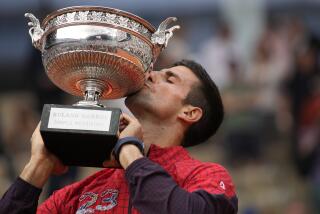Novak Djokovic, Andy Murray advance to Miami Open final

KEY BISCAYNE, Fla. — Two hours before the Miami Open semifinal, Novak Djokovic practiced his returns in an empty stadium, the ball coming at him quickly because his hitting partner stood several feet inside the baseline to emulate big-serving John Isner.
The drill helped. Djokovic achieved a breakthrough service break against Isner and won Friday night, 7-6 (3), 6-2.
“He’s probably the best server we have in the game,” Djokovic said. “But I managed to get a lot of serves back. That was one of the keys in the match, making him play and getting into the rally and making him work extra.”
The No. 1-seeded Djokovic closed to within one win of his fifth Key Biscayne title. His opponent Sunday will be two-time champion Andy Murray, who defeated Tomas Berdych, 6-4, 6-4.
Murray’s big month is off to quite a start. He’s also getting married next week.
Djokovic became the first player in the tournament to break Isner, and managed another break two games later. He actually outserved the 6-foot-10 American, totaling 10 aces to nine for Isner, and never faced a break point.
A taut, one-hour opening set created plenty of drama for the capacity crowd. Isner held despite several long service games and erased the only break point he faced late in the set, but he won just two of five points on his serve in the pivotal tiebreaker.
Isner said Djokovic is probably the game’s best service returner.
“On top of that, he’s very confident — he has won so many matches,” Isner said. “I certainly needed to play better in order to beat him, and I didn’t do it. He was too good. He was just way better.”
Djokovic’s biggest hole while serving was a love-30 deficit late in the first set. He responded with consecutive aces and escaped.
Djokovic’s first break gave him a 2-1 edge in the second set, and that margin grew to 5-1. He finished with just eight unforced to 31 by Isner, who lost 70 percent of his second-serve points.
“I needed to step in and use those opportunities,” Djokovic said. “When I have his second serve, I’d better use it properly and try to be aggressive.”
Djokovic won the Key Biscayne title in 2007, 2011, 2012 and 2014. Serena Williams bids for her eighth Key Biscayne title Saturday against Carla Suarez Navarro.
Murray won the championship in 2009 and 2013, and was the runner-up in 2012. The Scotsman has a home in nearby Miami and practices on the Key Biscayne courts.
“I’ve obviously played some good tennis here over the years,” Murray said. “The reason for that is because I’m extremely familiar with the conditions, with the surface, the way the court plays.”
But Murray is 8-17 against Djokovic, who has won their past six meetings, including this year’s Australian Open final.
“That gives me confidence, and maybe a slight mental advantage,” Djokovic said. “But we’re talking about small margins. That’s always the case when we play against each other.”
The No. 3-seeded Murray played almost flawless tennis against No. 8 Berdych, extending points with scrambling defense until the Czech would finally make a mistake.
Murray, by contrast, totaled only eight unforced errors from the baseline. He improvised, too, winning points with unorthodox strokes requiring compound adjectives, such as a running shoetop-scoop lob and an underhand-swipe backhand drop shot.
Murray fell behind love-30 serving in the final game but rallied and smacked winners on the final four points, including a nifty forehand volley and cross-court backhand. When a final forehand gave him the win, he screamed in jubilation and repeatedly pumped his arm like a piston.
“I just played a bit better than him. That was the difference,” Murray said. “When I was behind in games, like the last game, for example, I came up with some big serves and was able to dictate a lot of the rallies from the baseline.”
The final is Murray’s first since he was runner-up to Djokovic at the Australian Open on Feb. 1, and his first in two years at an ATP Masters 1000 tournament.
More to Read
Go beyond the scoreboard
Get the latest on L.A.'s teams in the daily Sports Report newsletter.
You may occasionally receive promotional content from the Los Angeles Times.










